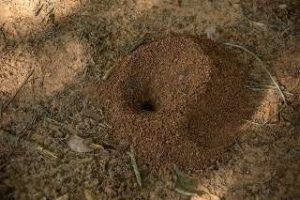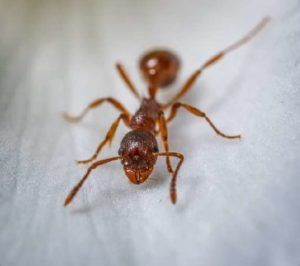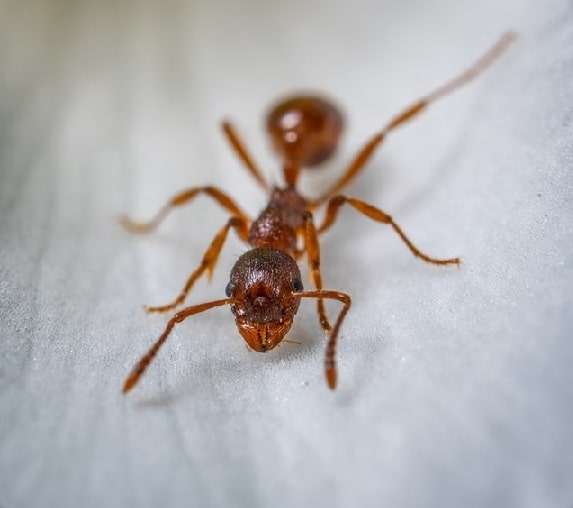Parents don’t like when their kids have ants in their pants, but don’t often bat an eye if they find ants in their house. Learn how ants operate and 8 practical ways to treat pavement ants.
We also explain how we treat pavement ants, so if you’re looking for the cost of ant control, give us a call today: 651-342-9489.
Table of Contents
Pavement Ants
Pavement ants have many names: little brown ants, sweet ants, common ants, immigrant pavement ants, sugar ants, and more, but these ants all are the same. So if you’re wondering how to treat black ants in Minnesota or brown ants in Minnesota, you’ve come to the right place!
These ants are the ones that live on driveways or in garages, making their homes in cracks within cement. You notice their ant hills made out of dirt, but did you know chances are that they have homes down there whether or not you see dirt piles? These ants make dirt hills in the warm months, but that doesn’t mean that they aren’t at home in the winter, hibernating deep enough in the earth.
Have you ever seen swarms of these little ants on the sidewalk? I used to always think it was because someone had dropped some food, but that’s not the case. In late spring and early summer these ants can be found swarming sidewalks if they encounter another colony.
Pavement ants are territorial, so when they find others in the area, they face off against one another, fighting to the death of sometimes thousands of ants.
Colony Life
Pavement ants are brown to black and pretty tiny. They are most noticeable by their size: they look like a carpenter ant might, but half the size.
Colonies are made up of worker ants, alates, and a queen ant. Alates ants are female ants that will become queen of a new colony someday.
Worker ants have a stinger on their back end, and they can actually sting humans. At most the sting will cause mild discomfort for a couple of minutes, but it just goes to show that little creatures pack a powerful punch.
Alates ants and drones (younger male ants) have wings, which they use to fly during the nuptial flight for mating purposes. This is exactly like the carpenter ants’ nuptial flight.
Once drones mate with the virgin queen ants, the drones usually die and the queens go off to start their own colonies. She raises the first generation of ants on her own, until that generation can help foster a larger community and gather food for the queen.
Just like carpenter ants nests, each pavement ant colony houses between 3,000 to 10,000 ants! Their nests can also be between 3 and 8 feet long and 2 feet deep, with many tunnels!
While most colonies are monogynous (which has to do with their singular sex organs) and only have 1 queen ant, sometimes colonies can have 2 queens or more queens. Very mature colonies have numerous queens and up to 30,000 worker ants!
You may think these ants are just fine outside your home, under sidewalks and driveways. While that is a better area than inside your home, thousands of ants over time move a lot of dirt from under that pavement or sidewalks. This can degrade the structural integrity of the driveways and sidewalks over time.
In Homes
Pavement ants don’t typically nest in homes. They may find shelter in cracks and crevices of garages or basements, somewhere with splitting ground within which they can harbor.
Every once in a while you may find little mounds of dirt in these locations: basements, garages, even bathrooms. They like damp, cool areas, and bathrooms provide a water source. They tunnel down into a crack or crevice to make their home underneath your home, but leave traces of their home behind.

Have you ever seen ants with wings swarm your homes? This is also a type of worker ant called a “swarmer”. These ants are different from wingless worker ants, which move along the ground and ground level of buildings.
Swarmers don’t mind heights and are attracted to lights, which make them the perfect ant to investigate your home or business for the colony.
Did you know the winged pavement ant is commonly mistaken for a termite? They are roughly the same size, shape, have wings, and can be similar in color too, depending which region you are in.
Pest management professionals take this into consideration when inspecting. With Minnesota’s winter temperatures below freezing and below zero frequently, subterranean termites are rare. This doesn’t mean that Minnesotans are safe from termites, it just means they are less common.
Termites can be brought in with construction materials, affecting homes around that construction zone. It is possible that termites can last through a Minnesota winter, just unlikely. Ultimately, it’s always best to know the warning signs of pests and get on top of the situation as soon as possible.
Fun Fact! Did you know pavement ants give off a banana-like smell to deter predators.
Spiders, centipedes, beetles, and other insects eat ants, so it’s good to know these pests don’t like the smell of bananas.
How We Treat
Each pest control company is going to have different standards for quality. Just like how every business does: it comes down to experience and training.
Done Right Pest Solutions has 15 years of experience treating crawling insects like pavement ants. Our technicians aren’t concerned with meeting a quota or production goal: we want them to be present in each and every job. This ensures that everything learned in our lengthy training is applied for your service.
Give us a call today for a free estimate for the cost of ant control: 651-342-9489.
Inspection
Inspection is key when it comes to pavement ant control, because it is important to use the right product for your specific ant problem. Exterior inspections around the perimeter of the home, in garage and of driveway and sidewalks may be completed, as well as inspecting the basement and ground levels of your home or business.
Most pest management professionals will look for a colony location, or at least be able to determine general whereabouts of the colony based on activity and clues pavement ants leave behind.
It is important to identify the exact variety of black ants in Minnesota or or brown ants in Minnesota before beginning the treatment process.
Did you know pavement ants can crawl beneath carpet? Pro tip for exterminators and pest conscious homeowners is to lift the edges of the carpet by the baseboards with a needle-nose pliers if you’ve seen other pavement ant activity.
Treatment
For any outside activity, we use a liquid product mixed with water and applied to the foundation of the home or business about 3 feet up and 3 feet out. This product will take care of any pavement ant colony near the foundation of the structure. This product dries in less than an hour and remains clear.
If your yard is often infested with these ants, the product may be applied to any mulch beds around flower gardens.
For any interior activity, we use commercial-grade liquid bait and bait stations to for pavement ant control. This can be applied to baseboards where these ants are traveling, or on the backs of kitchen counters/in cupboards where there has been activity. This product also dries clear and is best placed on surfaces that aren’t going to be touched regularly.
Prevention: 8 ways to treat pavement ants
 You can prevent most pests, but not all. Ants are one of those things where you can do everything right to keep them out, but for some reason they are still attracted to your house, hide in the wall voids, and travel along electrical lines.
You can prevent most pests, but not all. Ants are one of those things where you can do everything right to keep them out, but for some reason they are still attracted to your house, hide in the wall voids, and travel along electrical lines.
As long as you’re practicing good sanitation measures around your home, keeping food in sealed containers, and being mindful of cracks and crevices that pests can sneak in, you’re already doing well in preventative measures. Preventative pest control is the most effective pest control.
If you want to go one step further, we would suggest providing regular maintenance to the exterior foundation of your home, trimming bushes and plants, keeping any wood piles or leave piles away from your foundation.
There are also treatment methods you can try before calling a pest professional. Many of these are natural ant control methods.
- Terro Ant Killer is effective in killing the ants that come to it. Terro is a fast-acting bait that doesn’t make it back to the queen ant by way of the worker ants.
- You can try other over-the-counter baits or poisons for ants.
- Try making your own with borax and honey or syrup.
- White vinegar kills and repels ants.
- Black pepper or cayenne pepper deters ants.
- Cinnamon deters ants as well and it smells better to us!
- If you’re in the essential oil game, peppermint oil, tea tree oil, and eucalyptus oil has had a positive effect on repelling ants.
- Raid has repellent components to it, but it can detract from any bait that you use. Keep that in mind when contemplating ant control.
We do not recommend making your own ant poison if you have pets or small children that could get into your mixture. We also don’t recommend Terro because it won’t solve the source (the queen). If all worker ants die off and are unable to bring food back for the queen, the queen will come out. This process could take several weeks to a couple of months.
Options 4 through 7 offer natural ant control methods. Cinnamon, black pepper, cayenne pepper, and white vinegar are common household cooking items.
We recommend that you try different prevention techniques. If you use Raid, make sure to tell any pest control team that you hire, as it could affect their treatment methods as well.
Good ant control often requires multiple approaches: bait, non-bait, insecticide, dust, and repellent are options. If you have had an on-going problem with pavement ants or your techniques aren’t working, please contact a pest management professional today! We are here to help. Call today for a free estimate on the cost of ant control: 651-342-4989.
Pavement ants are common crawling insects, for additional tips and tricks regarding crawling insects, check out our category within our blog.
Conclusion & Next Steps
You have learned how pavement ants think, how they operate in their colonies, and where they pose a threat to your home or business. You also learned how we inspect and treat for pavement ants, along with some helpful ways to treat pavement ants from making a home in or under your home.
If at any point you’re feeling overwhelmed in your ant problem, give us a call! We would love to walk you through our treatment options and provide peace of mind with a warrantied service. Call Done Right for the best pest control service for all black ants in Minnesota and all brown ants in Minnesota.
Pavement ant control is included in our Peak Seasons Plan so if you have any other pest issues throughout the year, consider a year-round approach to preventative pest control.
Call us at 651-342-9489 or email us at donerightpestsolutions@gmail.com today. We can’t wait to help!
Done Right Team
Have you tried any of the methods in the prevention section on your ant problem? What was the outcome? We would love to hear from you!
Did you find this article helpful? Consider subscribing to our free email newsletter, which offers a targeted approach to things you want help with.

